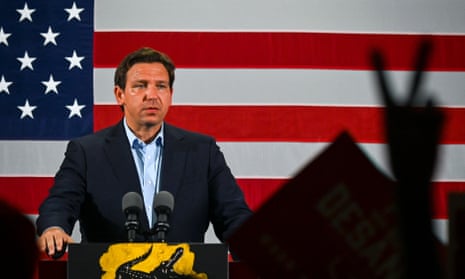A federal judge in Florida halted part of a state law that limits what colleges and universities can teach students about racism and sexism, calling it “positively dystopian”.
Issuing a temporary injunction on the law on Thursday, US district court judge Mark Walker said it violates first amendment rights to free speech, and 14th amendment rights to due process on campuses.
Signed into law in April, the legislation – called the Individual Freedom Act and the Stop-Woke (Wrongs to Our Kids and Employees) Act – prohibits educational institutions and businesses from teaching students and employees anything that would cause anyone to “feel guilt, anguish or any form of psychological distress” due to their race, color, sex or national origin.
It specifically outlaws teachings that may promote guilt or invoke senses of privilege for “actions committed in the past by other members” of a group.
“No one should be instructed to feel as if they are not equal or shamed because of their race,” Ron DeSantis, Florida’s governor, said in April, after signing the bill. “In Florida, we will not let the far-left woke agenda take over our schools and workplaces. There is no place for indoctrination or discrimination in Florida.”
The judge responded scathingly in his injunction, making a reference to George Orwell’s Nineteen Eighty-Four: “‘It was a bright cold day in April, and the clocks were striking 13,’ and the powers in charge of Florida’s public university system have declared the state has unfettered authority to muzzle its professors in the name of ‘freedom,’” he wrote.
“Defendants argue that, under this act, professors enjoy ‘academic freedom’ so long as they express only those viewpoints of which the State approves. This is positively dystopian.”
DeSantis has maintained a reputation as a crusader against progressive politics. Earlier this month he was re-elected for a second term and is reportedly considering a presidential run in 2024 against Donald Trump, who helped DeSantis build his national profile.
The judge’s ruling stops the law’s implementation in colleges and universities in the state. Walker in August blocked the law from affecting businesses, and other challenges are in progress regarding the law’s impact on K-12 education.
Walker, who was appointed by Barack Obama, also issued a ruling in January against a conflict-of-interest policy that barred University of Florida faculty from participating in lawsuits against the state, including testifying against state law.
“Our professors are critical to a healthy democracy, and the state of Florida’s decision to choose which viewpoints are worthy of illumination and which must remain in the shadows has implications for us all,” Walker wrote on Thursday.
“If our ‘priests of democracy’ are not allowed to shed light on challenging ideas, then democracy will die in darkness.”
The DeSantis administration said it plans to appeal the ruling. A spokesperson told the Washington Post that the law “protects the open exchange of ideas by prohibiting teachers or employers who hold agency over others from forcing discriminatory concepts on students as part of classroom instruction or on employees as a condition of maintaining employment”.
“An ‘open-minded and critical’ environment necessitates that one is free from discrimination,” the spokesperson said.
